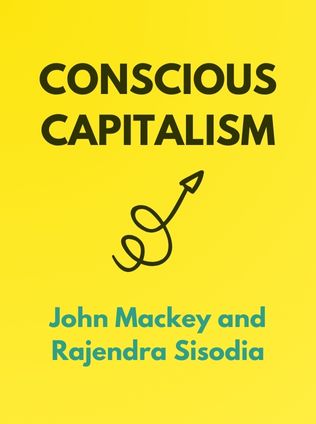
Conscious Capitalism
Liberating the Heroic Spirit of Business
By John Mackey and Rajendra Sisodia
Published 12/2012
About the Authors
John Mackey, the co-founder and former CEO of Whole Foods Market, and Raj Sisodia, a professor of global business, are the driving forces behind the concept of Conscious Capitalism. Their collaborative book, “Conscious Capitalism: Liberating the Heroic Spirit of Business,” introduces a transformative approach to capitalism, one that emphasizes ethical considerations, stakeholder involvement, and the long-term benefits of a conscious approach to business.
Mackey’s experience in leading Whole Foods Market, a company known for its commitment to healthy eating and environmental sustainability, provides a real-world backdrop to the theories presented in the book. Sisodia, with his academic background, contributes a theoretical framework that reinforces the practical examples Mackey provides. Together, they challenge the traditional profit-centric model of capitalism and advocate for a more inclusive, socially responsible approach.
Main Idea
The central premise of “Conscious Capitalism” is that capitalism, when practiced consciously, can be a force for good. Mackey and Sisodia argue that businesses should not solely focus on profit maximization but should also consider the impact they have on all stakeholders—including employees, customers, suppliers, communities, and the environment. By doing so, businesses can achieve long-term success, create more value for society, and foster a more equitable and sustainable world.
The authors introduce the concept of conscious capitalism as an evolved form of capitalism that recognizes the interconnectedness of all stakeholders. This approach not only leads to better business outcomes but also contributes to the overall well-being of society. The book is structured around key principles of conscious capitalism, offering both theoretical insights and practical examples to guide businesses in implementing this approach.
Table of Contents
- Introduction: The Conscious Capitalism Movement
- Part 1: The Need for Conscious Capitalism
- Part 2: Everyone Benefits from Conscious Capitalism
- Part 3: Becoming a Consciously Capitalist Company
Introduction: The Conscious Capitalism Movement
The introduction sets the stage by discussing the origins of the conscious capitalism movement. The authors reflect on the criticisms of traditional capitalism, particularly its focus on short-term profits at the expense of broader social and environmental considerations. They argue that a more holistic approach is necessary, one that recognizes the interconnectedness of all stakeholders and the long-term benefits of doing business ethically.
"Capitalism is inherently good for people, but conscious capitalism is even better because it benefits all interested parties—including the environment and society at large." - John Mackey
Part 1: The Need for Conscious Capitalism
In this section, Mackey and Sisodia delve into the rationale behind conscious capitalism. They explain that while free-market capitalism has contributed significantly to human progress, it has also led to numerous social and environmental challenges. The authors argue that these challenges arise not from capitalism itself but from a misapplication of its principles.
They address common criticisms of capitalism, such as the widening gap between the rich and the poor, environmental degradation, and cronyism. The authors assert that these issues can be mitigated through conscious capitalism, which aligns business practices with society’s evolving values and priorities.
For example, the authors highlight how traditional capitalism often prioritizes shareholder profits over the well-being of other stakeholders. This approach can lead to unsustainable practices that harm the environment, exploit workers, and alienate customers. Conscious capitalism, on the other hand, seeks to balance the needs of all stakeholders, leading to more sustainable and ethical business practices.
"People mistakenly believe that capitalism inevitably causes social and environmental problems because many businesses prioritize profits at the expense of the public and the environment." - Raj Sisodia
The authors also discuss the importance of a purpose-driven approach to business. They argue that companies that operate with a clear and compelling purpose beyond profit-making are more likely to succeed in the long run. This purpose should be deeply ingrained in the company’s culture and guide all decision-making processes.
This approach is not just theoretical; it is backed by real-world examples. Companies like Whole Foods Market, Patagonia, and Ben & Jerry’s have thrived by adopting a purpose beyond profits. These businesses have created loyal customer bases, motivated workforces, and strong brand identities by staying true to their values. For instance, Patagonia’s commitment to environmental sustainability has not only garnered customer loyalty but also set it apart as a leader in the outdoor apparel industry.
Moreover, the authors argue that conscious capitalism can address the issue of income inequality, a common criticism of traditional capitalism. By ensuring that all stakeholders share in the success of the business, companies can help reduce the wealth gap. For example, companies can offer profit-sharing programs to employees, ensuring that they benefit directly from the company’s success. This not only improves employee morale and retention but also creates a more equitable distribution of wealth.
The authors also touch on the environmental challenges posed by traditional capitalism. They argue that a conscious approach to capitalism is essential for addressing these issues. By prioritizing sustainability and environmental responsibility, businesses can reduce their ecological footprint and contribute to a healthier planet. This is not only good for the environment but also for business, as consumers are increasingly demanding eco-friendly products and practices.
Part 2: Everyone Benefits from Conscious Capitalism
This section explores how conscious capitalism benefits all stakeholders involved in a business. Mackey and Sisodia emphasize that a business’s success depends on the well-being of its stakeholders, and by ensuring that everyone benefits, businesses can achieve sustainable success.
Sign up for FREE and get access to 1,400+ books summaries.
You May Also Like
Rich Dad Poor Dad
What the Rich Teach Their Kids About Money - That the Poor and Middle Class Do Not!
By Robert T. KiyosakiFreakonomics
A Rogue Economist Explores the Hidden Side of Everything
By Steven D. Levitt and Stephen J. DubnerThe Lean Startup
How Today's Entrepreneurs Use Continuous Innovation to Create Radically Successful Businesses
By Eric RiesWho Moved My Cheese?
An Amazing Way to Deal with Change in Your Work and in Your Life
By Spencer Johnson, M.D.Factfulness
Ten Reasons We're Wrong About the World – and Why Things Are Better Than You Think
By Hans RoslingMake Your Bed
Little Things That Can Change Your Life...And Maybe the World
By William H. McRaven



















